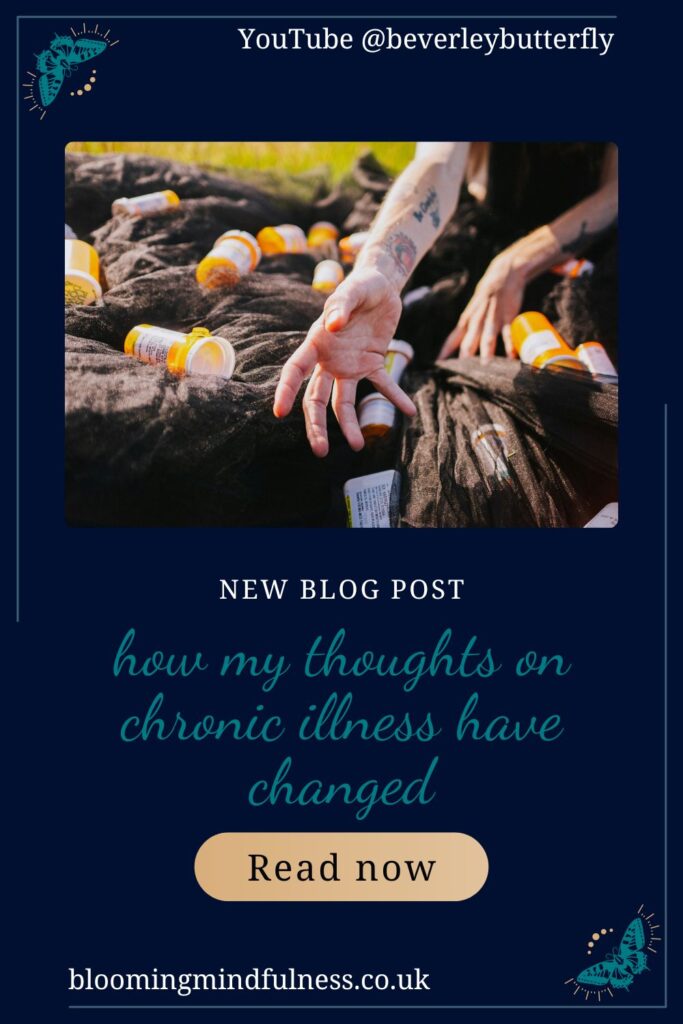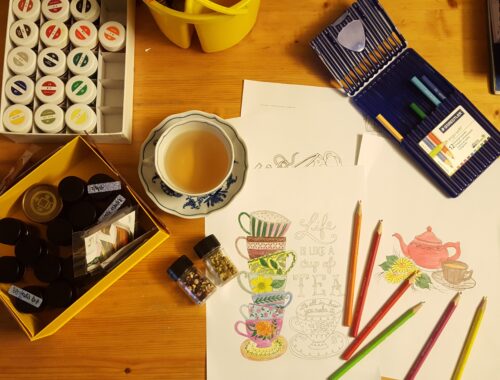
How my thoughts on chronic illness have changed
In this week’s blog post, I thought we would chat about how my thoughts on chronic illness have changed. So, grab a cup of tea lets chat.

Image description: an arm is seen reaching for scattered medicine bottles
If you are new to my blog, I should mention that I was a nurse before I became too sick and so my attitudes were very different. As medical professionals, you are conditioned to want to heal and I often got the impression that, especially doctors, wanted to be in surgery or work with illness that they could make better.
Chronic illness to me felt like something that rarely occurred because I generally saw people who had been in accidents or were recovering from illness. I assumed though, that if you had a long-term condition, you would be supported and helped through it in the same way.
However, that soon changed when I suddenly lost feeling in my left lower leg and was in so much pain I couldn’t walk properly. I lost my job and had to move back in with my parents, the reality I was living was very different to what I thought would happen to someone with a long-term condition.
I was met with suspicion, as if I was faking and lazy not wanting to work, when in reality I tried about ten different jobs before having to admit my body wasn’t able to work. When high dose steroids took me from a UK size 12 to a 20 in a month, I was constantly told to lose weight and even mocked in one appointment for being fat!
My weight was not my fault, and I was unable to lose it due to a medication I was on, but I was offered no help or advice. While on that medication many healthcare professionals blamed my health issues on my weight even though I had become sick long before my body changed.
At this time, I struggled to feel like my body belonged to me, I had never been so big, and it had not been my fault. On top of that, I lost sensation over my body so I would constantly feel as if I were not in the world, it was such a strange time.
I felt as if the medical system had made me fat through these steroids, then kept me on medication that made it impossible to lose it, then made out it was my fault. I struggled with depression, my old eating disorder came back so I was not eating properly, and the world just saw me as a lazy woman who did not want to work.
This couldn’t have been further from the truth; I had only qualified as a nurse 18months before my first big flare. Why would I have gone to the trouble of going to university to just give it up straight after? I was starting to get my confidence and to really learn, so I couldn’t understand why anyone would assume someone sick was lazy.
But this just shows how my thoughts on chronic illness have changed over time because now I know that is what most people think. Just listen to the politicians acting like if they give benefits, we can actually live on everyone will suddenly be faking being sick like we all already are!
The UN has recently looked into how the disabled community is treated here in the UK, yet none of the mainstream news spoke about it. We are only ever spoken about if we are going to be seen as inspiration porn or shown as being lazy and just wanting money for nothing.
The reality is that I would love to work and have a job from home, be able to go on holidays and buy the things I want. But jobs like that are hard to come by, and with my chronic fatigue it would be impossible for me to be able to do the hours required.
I feel frustrated with the world now, because you would think after Covid, people would be kinder, and the world would be more accessible. That there would be more work from home jobs available, and better access to things like watching theatre productions from home and concerts.
We know it is possible, because it was done during Covid, yet most of those things quickly went away as society was eager to go back to ‘normal’. And though more people have become disabled or chronically sick after the pandemic, societies attitudes towards us have not changed for the better.
I guess to understand how my thoughts on chronic illness have changed over time, you have to understand that we thought Covid would change the world. The frustrations come not from my body and my illnesses, but a society and system that seems to leave me out of the equation or makes me out to be lazy or faking constantly.
I hope this will change, but when this attitude comes from the government as well, it can be hard to see a way forward. As mental health advocates, it can often feel as if we are screaming into a void, and nobody wants to hear it.
How my thoughts on chronic illness have changed over time, has been interesting to think about as I have seen both sides of the medical experience. I hope it helps you to understand the chronic illness experience just a little bit better, and to stop viewing us all as faking or lazy.
We are just people who got sick and are trying to live our best lives regardless.
Thank you xx
If you enjoy what I do, please support me on Ko-fi as a one-off tip or on Patreon for just £2 a month! that can help me keep my YouTube & blog going xx





4 Comments
Sarah
100% agree m’love. The amount of societal gaslighting since Covid hit has been mindboggling, and this determination to ‘get back to normal’ is diabolical. That’s on top of the awful way our media & politicians use the chronically ill as a political football 🙁
admin
I completely agree, we are made out to be evil spongers while the PM’s wife doesn’t pay taxes on her business! Its insane and I do not understand it at all but at least we have safe places where we can talk and be open xx
Kaz
Portraying people who are on benefits and/or are chronically ill in a negative way really frustrates and angers me. The impact on people’s mental health because of the negative talk about them is huge. I really wish there was more compassion but sadly it is very lacking. I am very lucky to be able to work from home, which means I can manage my hidden disabilities better. However, the amount of hoops I had to jump through to get my reasonable adjustment was many. It was a long drawn out process, where I had to explain everything again and again, as they just didn’t get it.
admin
Oh yes, it is insane with the internet that more jobs are not work from home it would open up so many more opportunities for disabled people to work. It is infuriating!